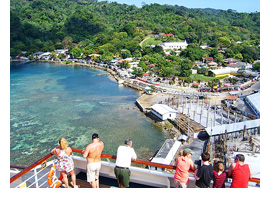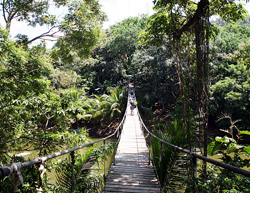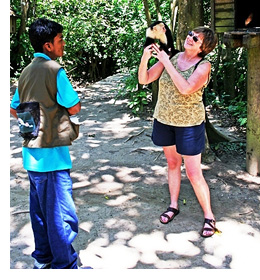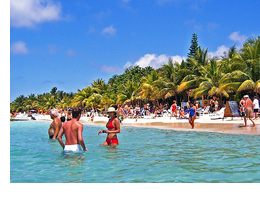|
||
| Pirates, Parrots and Monkeys: Isla Roatan, Honduras By Chris Millikan |
||
 For
seven glorious days, Carnival’s Valor drops my hubby and me at a series
of hot-hot-hot Caribbean ports for sunny adventures. Isla Roatan, a tropical island
30 miles off the northern Honduran mainland is no different. First glimpsed from
our balcony, this emerald isle sparkles in the morning sun, and buzzes with construction
of its new cruise ship terminal. For
seven glorious days, Carnival’s Valor drops my hubby and me at a series
of hot-hot-hot Caribbean ports for sunny adventures. Isla Roatan, a tropical island
30 miles off the northern Honduran mainland is no different. First glimpsed from
our balcony, this emerald isle sparkles in the morning sun, and buzzes with construction
of its new cruise ship terminal.
Flamboyantly costumed and masked Garifuna performers welcome us ashore, dancing wildly and chanting to frenetic drum music from their African heritage. Like us, everyone stops for photos! With a couple of adventurous friends in tow, we dodge waiting tour buses and craft market frenzy, eager to explore beyond this bustling pier. Quickly striking a deal with David, a 16-year-old guide, we taxi northward from Coxen Hole, the island’s most populated town. Driver Luis speaks only Spanish; David speaks excellent English, guiding visitors like us by day and attending school at night. When asked about the remarkable traditional dancers at the pier, David explains, “Long ago local natives and shipwrecked Africans intermarried, creating a new culture. Nowadays, about 200,000 Garifuna live in the Caribbean, mainly in Honduras, Belize and Guatemala.” As we roll along the scenic coastal road, he fills us in, “This main road goes from one end of our island to the other. It’s in pretty good shape, but if you go off, it’s so rough you need a four-wheel drive.” Past crystal turquoise waters lapping pretty beaches, and laundry dancing in the breezes outside rainbow-colored houses, we arrive at Gumbalimba Park. We enter through a pirate cave where life-sized pirates stand at attention; chests of treasure, old weapons, pictographs and maps conjure up those days in the mid-17th century. In the coolness of Coxen’s Cave, we consider English buccaneer Henry Morgan, who established his base here. Then, pirate hordes of over 5,000 had sheltered their sloops and schooners around Roatan’s protected Bay islands. Brilliantly colored parrots and
macaws enliven the air, squawking and shrieking raucously. Glancing upward, we
spot flashes of scarlet, yellow and lime against cloudless blue skies as they
flit, float and fly to gnarly perches below. Crossing a rope suspension bridge
over a pretty lagoon filled with turtles, we descend along a leafy trail to where
many fellow visitors pause for souvenir pictures with these friendly, feathered
fellows sitting on shoulders, outstretched arms, and even heads. Stopping next at West Bay beach, we frolic and splash like a bunch of kids as we paddle and wade, cooling off in the in shallow azure waters with scores of others. Many locals with their big, fun-loving families happily swim, ride inflated toys, and play frisbee along this beautiful crescent of sand bustling with activity.
Browsing for more local crafts in open-air shops back in Coxen Hole, shopkeepers call out, “Where you from?” and “How you like our island?” Carved toys, wooden bowls, masks and canes fill many tables; hand-thrown pottery and carved slate items abound. Heading onward to the ship, we sway, prance and hum to the compelling rhythms of the lively dockside band decked out in jaunty straw hats and embroidered shirts. Hammering away on their wooden marimba and singing harmoniously, they grin and nod at our shenanigans as we pass. At dinner, our tablemates share
events from the day. They tell us endearing tales of touching, stroking and even
kissing dolphins at Anthony’s Key and sunning themselves on popular Tabyana
beach. Others snorkeled in crystal waters above some of the world’s most
unspoiled coral, “Second only to Australia’s great barrier reef,”
my snorkelling hubby confides. Wendy and Al had explored Roatan’s East End.
“Still pretty rural and undeveloped,” they report. “Over at
Dixon Cove Harbor we boarded island-style boats and visited a shipwreck out on
the reef, then sampled jellies and jams made from island plum, hibiscus, and other
tropical flowers at a typical farm.” It’s no wonder Isla Roatan is emerging as the Caribbean’s newest holiday hotspot. In fact, the New York Times recently named Roatan one of the“53 Places to visit in 2008.” And although swanky resorts are rapidly developing along this island’s pristine stretches of white powder sand, on our daytrip we encountered a simpler, more natural Roatan. I suspect its flavor will change, way too soon. IF YOU GO: · For Full Information:
www.carnivalcruise.ca This week Traveling Tales welcomes freelance writer Chris Millikan who lives in North Delta, a suburb of Vancouver, B.C. on Canada’s West Coast. About the photos: |



